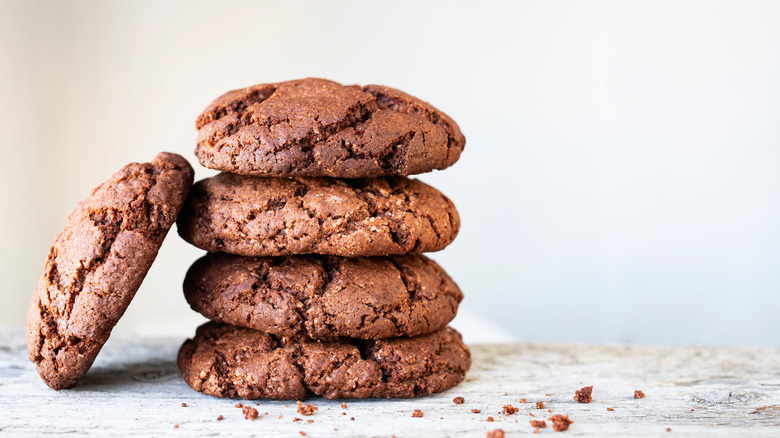Add A Tangy Balance To Your Cookies By Swapping In Goat Butter
Bakers strive to create the perfect cookie, a taste of comforting tradition that simultaneously provides an X-factor while offering a lovable recipe the whole family enjoys. From adjusting the proportions of ingredients to more creative substitutions, our grandmothers' old-fashioned cookies have been transformed, and snackers around the world have been both surprised and delighted.
While using salted butter in cookie recipes can help elevate a normal recipe — not only is the ingredient totally accessible, but salted butter can help turn up the volume on all your taste buds — other types of butter can impact your finished baker's dozen. With the simple trade of cow butter to butter made from goat's milk, your cookies are in for a culinary upgrade.
Goat butter does not taste like the goat cheeses you've sampled from your local market. Goat butter is more mild in taste. If you were to conduct a taste comparison with cow butter, you'll notice a bit more of an earthy tang while sampling buttered toast. The difference is slight, subtle enough to be lost when sautéing vegetables on the stovetop, but when used in baking recipes like cookies and scones, goat butter takes a noticeable step forward.
A culinary X-factor
Goat butter isn't yellow like the butter made with cow's milk. Goat butter is white and translucent, closer in appearance to shortening than the yellow sticks more commonly purchased from stores. The reason is largely because goats process the grass they eat differently than cows, converting beta-carotene into vitamin A.
Color isn't the only difference between the two dairy products. Though goat and cow butters carry similar fat compositions, goat butter has a lower melting point. This matters to bakers. At room temperature, goat butter is softer and easier to whip and fold into recipes. Goat butter's melting point helps cookies deliver a tender, grainier bite since the fat from the melted goat butter can better cover the protein found in flour and restricts the development of gluten. The result is a "short" cookie that is more crumbly and chewy.
No, cookies made with goat butter won't taste like they were baked in a barn, but your recipes will have a subtle flavor that will have your guests asking for all your baking secrets, as the earthy taste of the goat butter will complement the sugary sweetness of most cookie recipes. Granted, goat butter doesn't necessarily come cheap, so use sparingly or save the surprise inclusion for moments to remember.

